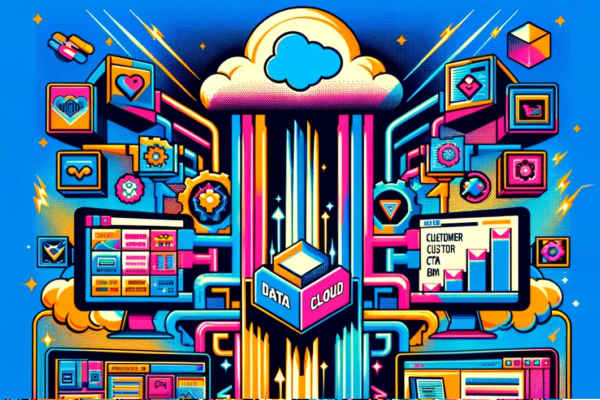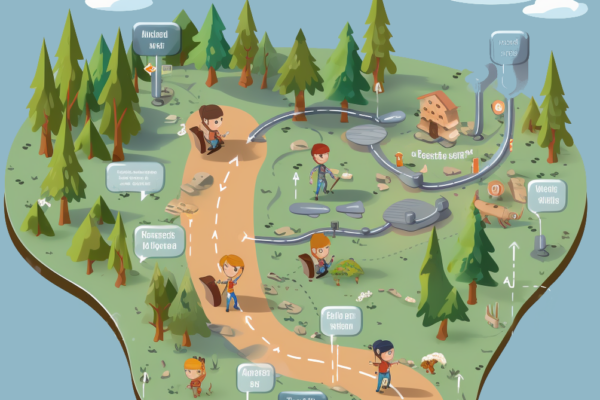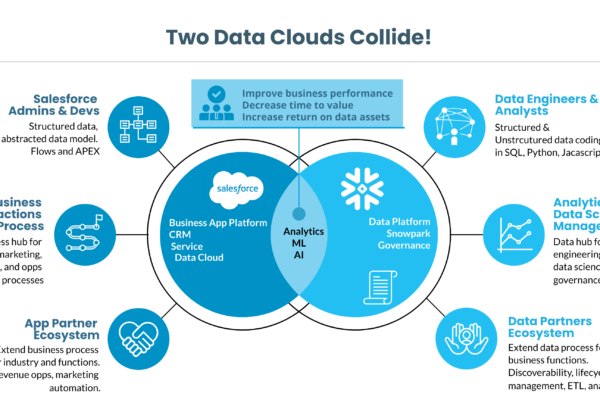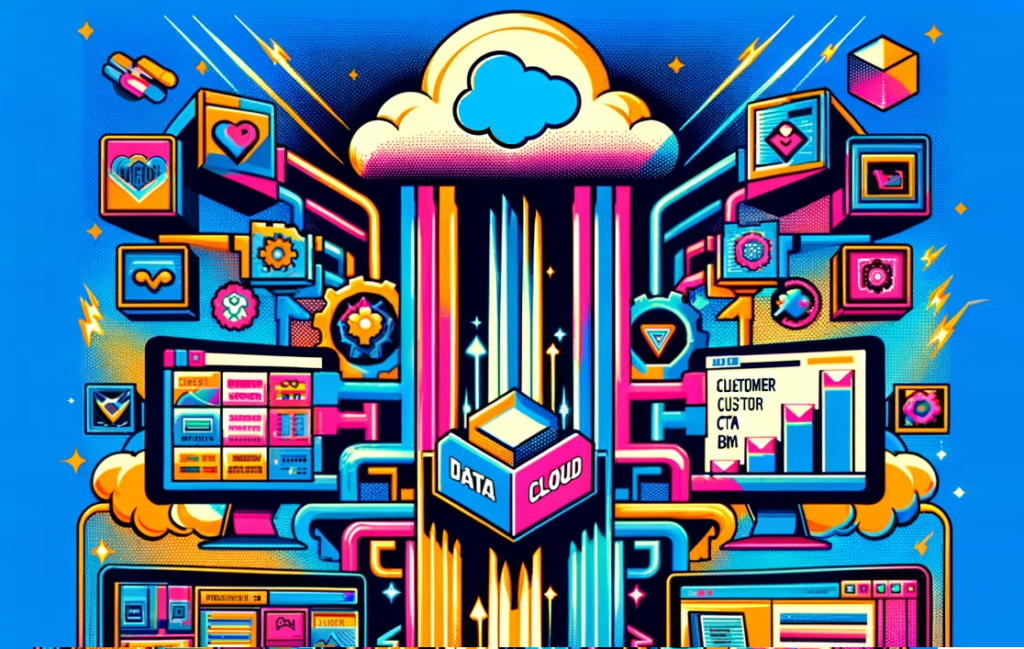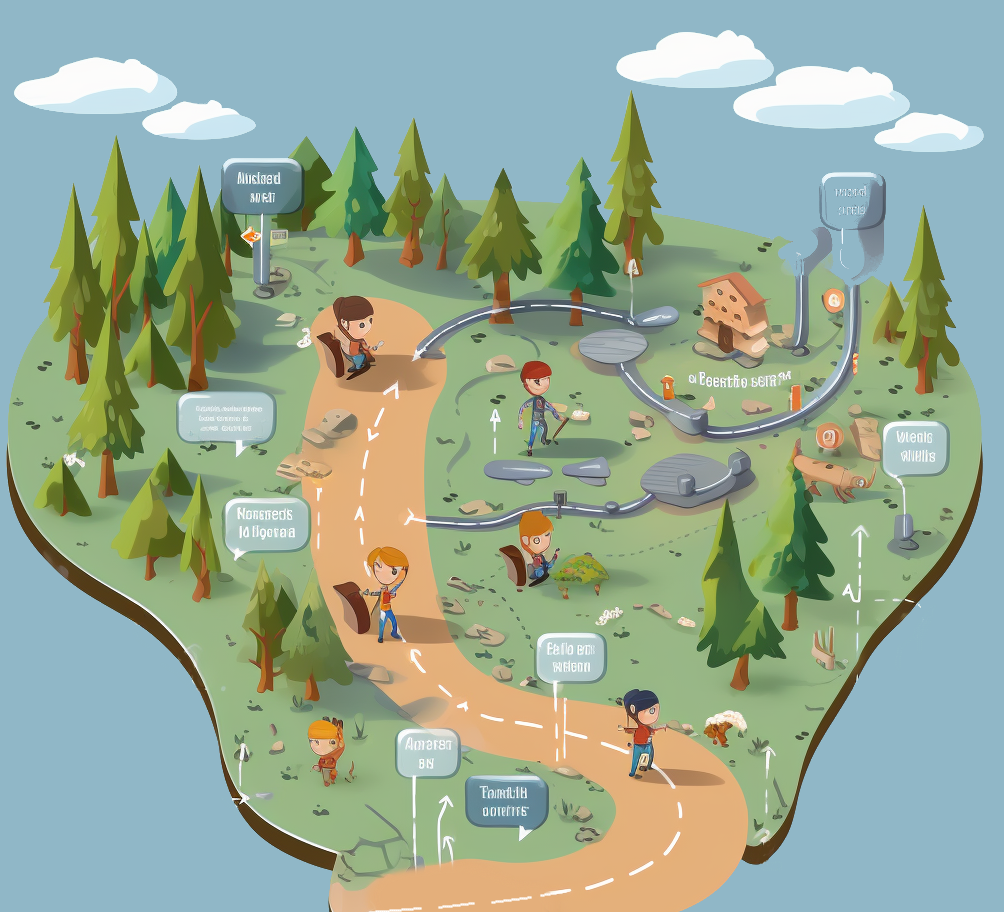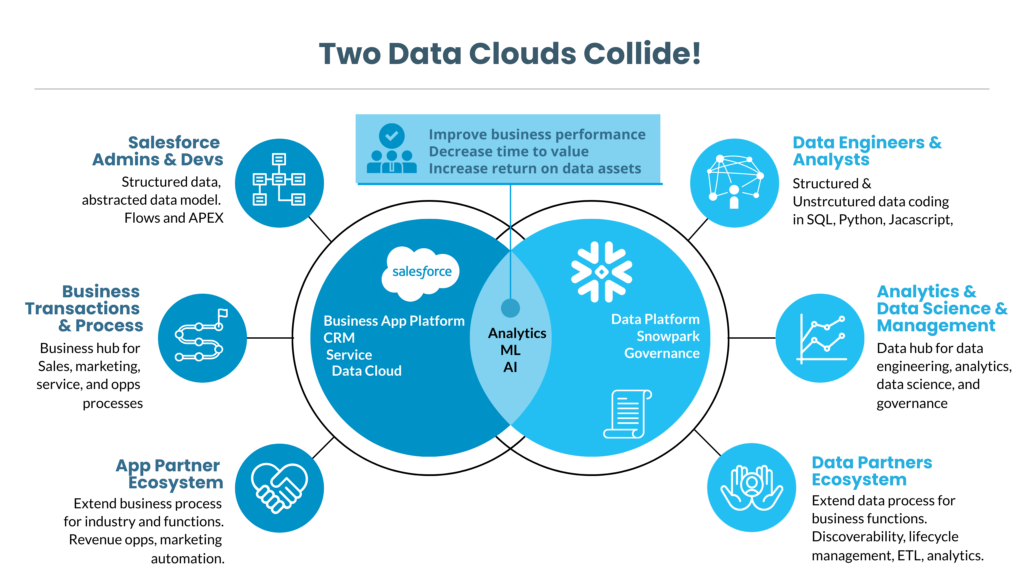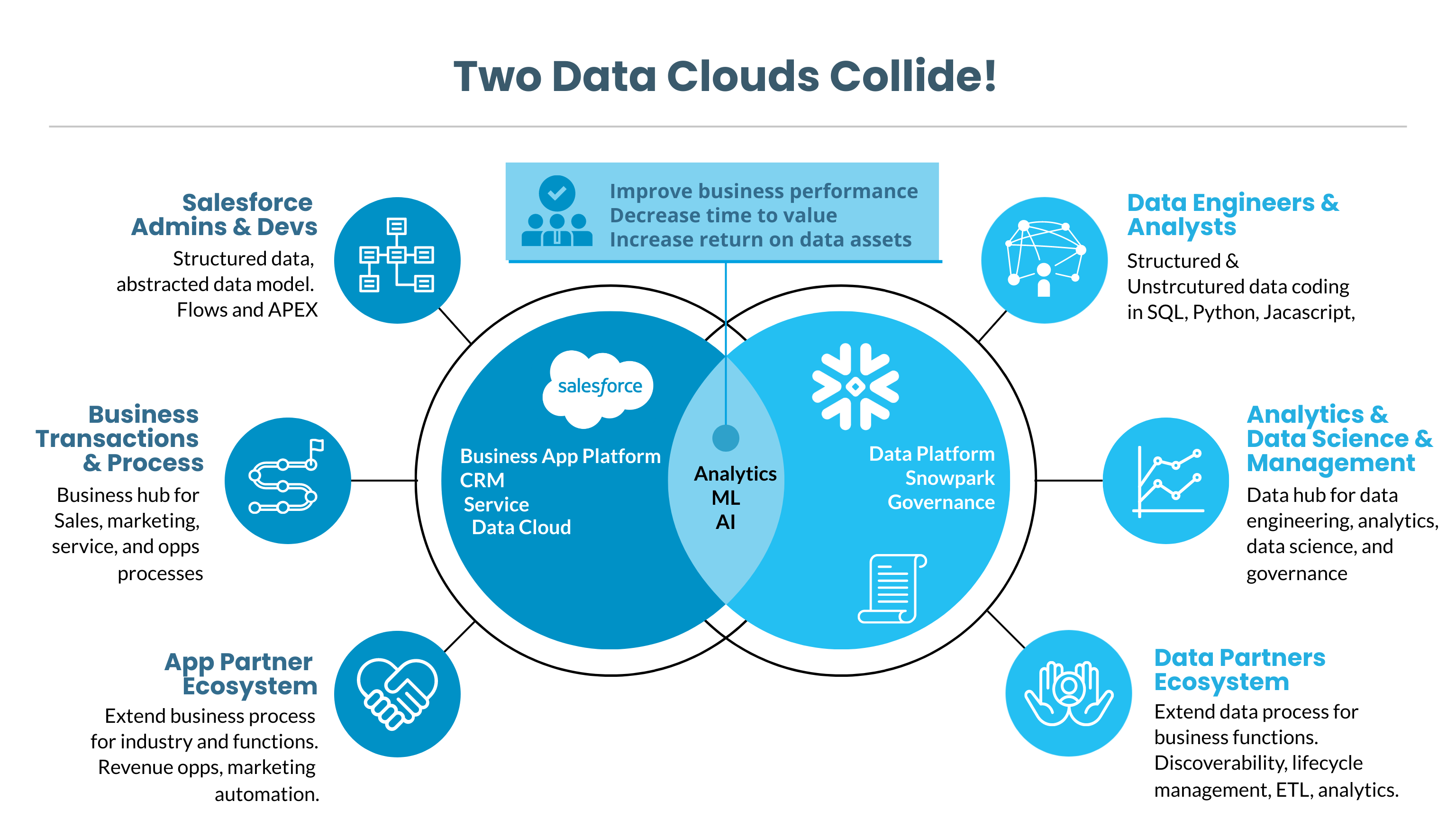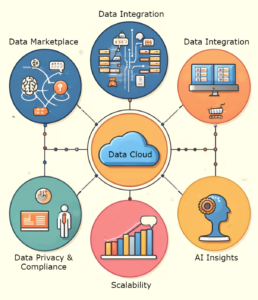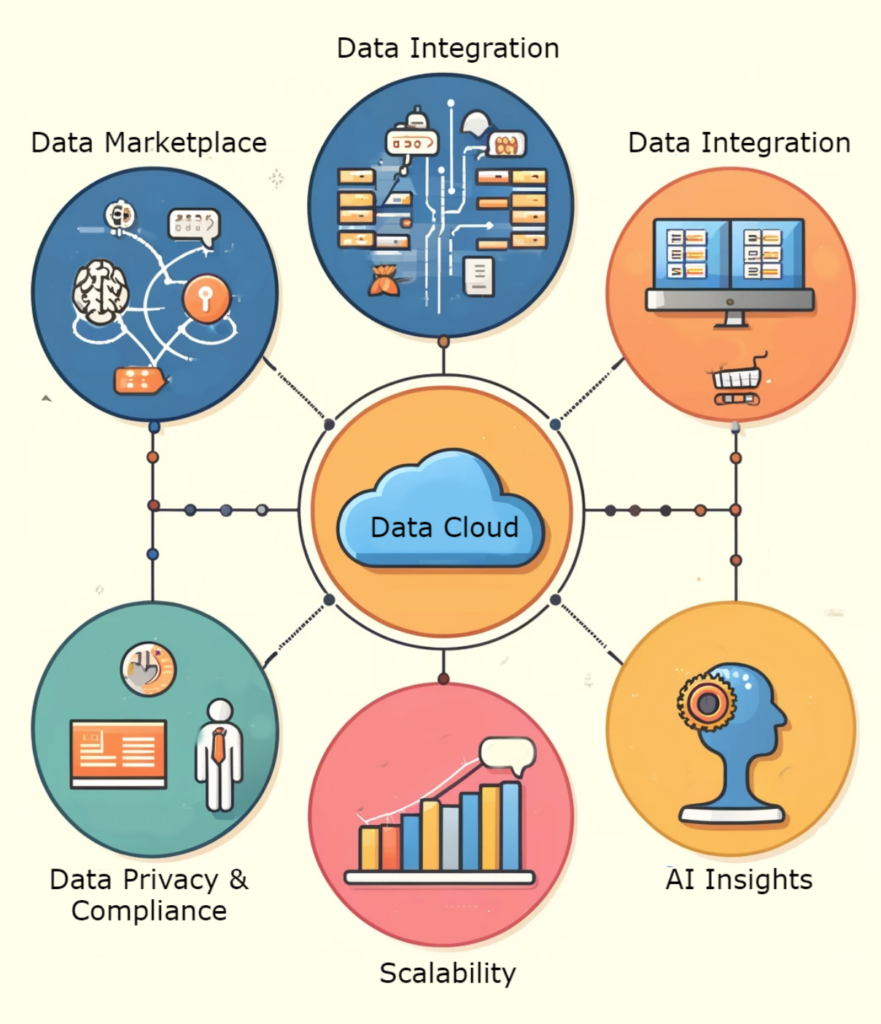
Salesforce Data Cloud is here to help enterprises move from being transaction centric to information based. Recording sales, processing orders, and tracking customer interactions through various processes is what helped Salesforce grow to one of the world’s largest enterprise software companies. Typically, Salesforce is one node in a complex network of loosely integrated applications and services. Modern data warehousing and data lakes have served as a hub to bring disparate data sources together for analysis. Data Cloud aims to solve integrating disparate data for analysis and action.
Salesforce Data Cloud
Activating data into assets into decisions and actions across systems is hard work. Salesforce Data Cloud offers a comprehensive suite of tools to create relationships not only be tween disparate systems, but also data lakes and data warehouses. Salesforce is leaning on modern standards and learning into Snowflake, DataBricks, and Google Cloud. Acknowledging and integrating existing data cloud investments is a big part of Salesforce’s vision to “bring your own data lake.”
So far most of the messaging and examples for activating Data Cloud are facilitating better data-driven customer experiences . It sounds great in writing, but the journey for enterprises will require true cross discipline and organization collaboration.
CRM Transactional System of Record
CRM systems have traditionally served as the transactional system of record, capturing customer interactions, sales transactions, and service requests. While valuable, these transactional records often provide a limited view of customer relationships and preferences. Salesforce Data Cloud expands on this foundation by integrating additional data sources and enriching customer profiles with contextual insights, behavioral data and centralizing many customer signals.
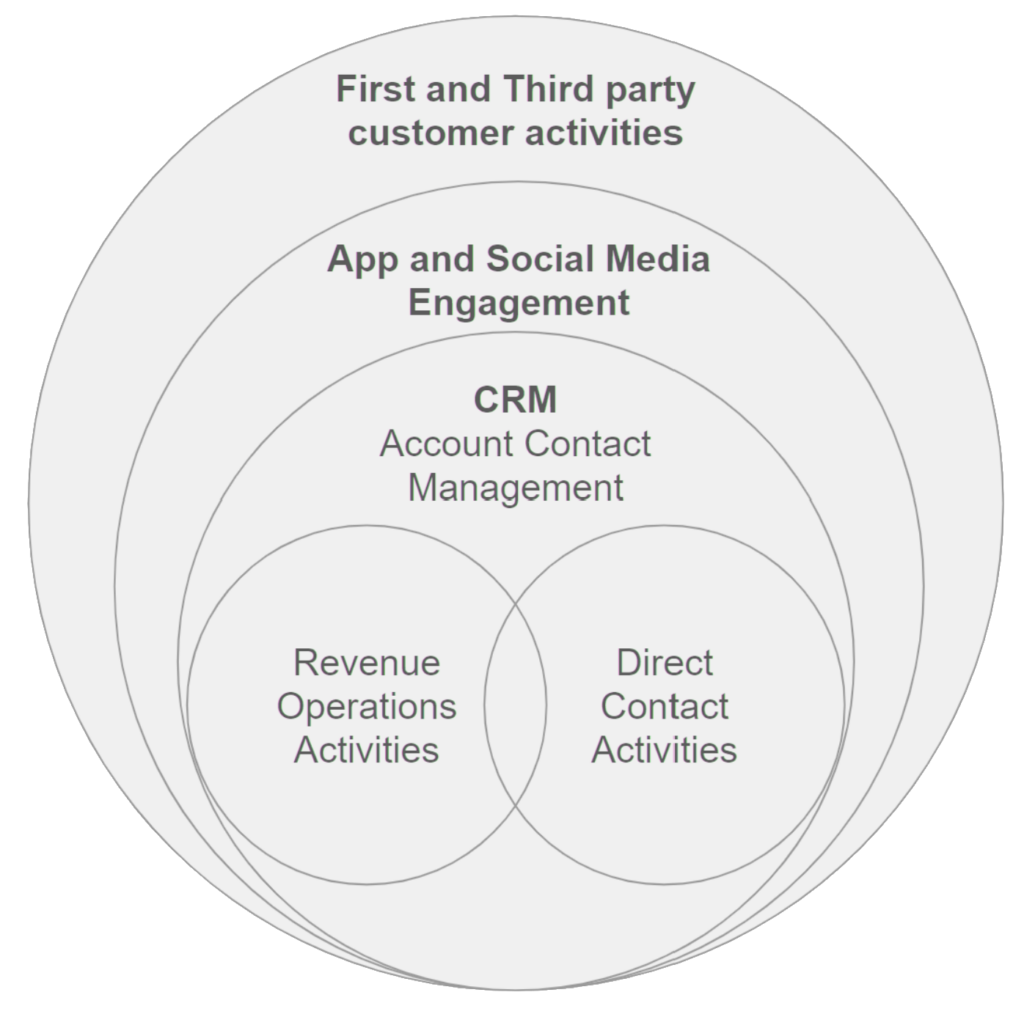
How Salesforce Data Cloud Organizes Data Graphs
Salesforce CRM organizes a relational model that connects accounts, contacts, and activities. Data Cloud creates a data graph that establishes connections based on various objects, including purchase history, communication channels, social interactions, and demographic data. Learn more about Salesforce Data Graph Structures
This graph structure is powerful when implemented, but integrating disparate data into Data Cloud requires the same expertise, thoughtful design, and deep understanding of data / meta-data management.
Salesforce Data Cloud Connects to Disparate Business Applications and Data Clouds
One of the strengths of Salesforce Data Cloud lies in its ability to connect to disparate systems meta-data all within a common and familiar Salesforce cloud. Putting structured and semi structured data from business applications, cloud tools, and other data lakes are possible. Whether it’s CRM platforms, marketing automation tools, social media channels, e-commerce platforms, Data Cloud integrates data from diverse sources into a unified data graph. This integration eliminates data silos and timely data extraction and management processes to gain visibility needed to understand data relationships.
Shift from Single Centralized System / Source of Truth
Coupled with innovative “zero-copy” data integration via “bring your own data lake”, Data Cloud is primed to integrate many clouds like Snowflake, Databricks, and Google Cloud platform without the expensive and slow bottlenecks that can occur with big data and dealing with terabytes of information. The ultimate 360-degree view of a customer has been the battle cry for every business software product for years. Only a small fraction of enterprises that embarked on the journey have publicly shared their success and have also produced sustained growth numbers to match the success story.
Key Features of Salesforce Data Cloud

Data Governance
Data governance is another critical aspect of Salesforce Data Cloud. With robust security measures, data encryption, and compliance tools, organizations can ensure data integrity, privacy, and regulatory adherence. Additionally, advanced analytics and AI for deploying models, predictive analytics, and AI-driven insights are pivotal to putting data to action.
Integration with Salesforce Ecosystem
A key strength of Salesforce Data Cloud lies in its seamless integration with the broader Salesforce ecosystem. This integration extends to Salesforce CRM, Marketing Cloud, Service Cloud, and other Salesforce products, creating a unified data environment. Furthermore, integration with third-party applications and APIs enhances functionality and flexibility, allowing organizations to customize data workflows and processes according to their specific needs.
This unified ecosystem streamlines data management, enhances collaboration across teams, and accelerates time-to-insight. Whether it’s enriching CRM data with external sources, automating micro-segmentation marketing campaigns based on event and time sensitive insights, or leveraging AI-driven analytics for sales forecasting, the integration capabilities of Salesforce Data Cloud empower organizations to extract maximum value from their data assets.
Data Governance and Compliance
In heightened data privacy concerns and regulatory scrutiny, Salesforce Data Cloud prioritizes data governance and compliance. Robust security measures, including data encryption, access controls, and audit trails, ensure that sensitive information remains protected at all times. Compliance tools help organizations adhere to industry regulations such as GDPR, CCPA, HIPAA, and more, mitigating compliance risks and enhancing trust with customers.
Additionally, the growing emphasis on ethical data practices, transparency, and data privacy will shape the evolution of data cloud platforms. Salesforce’s commitment to data ethics, trust, and security positions Salesforce Data Cloud as a trusted partner in navigating the complexities of modern data management.
Challenges and Considerations
While Salesforce Data Cloud offers immense value in concept, organizations may encounter certain challenges during implementation. These challenges may include data migration complexities, meta-data mapping, integration with legacy systems, and user training requirements. Addressing these challenges requires careful planning, stakeholder buy-in, and a phased approach to deployment.
Getting Started with Salesforce Data Cloud
The future of data management revolves around agility, intelligence, and scalability. Salesforce Data Cloud is well-positioned to address emerging trends such as AI-augmented everything, machine learning, and real-time data processing. The convergence of data integration, analytics, and AI capabilities under one integrated platform is certainly attractive for enterprises vested in Salesforce.
Curated Salesforce Data Cloud Resources
Salesforce Data Cloud represents could represent a complete paradigm shift in how you think about Salesforce as a data integration platform. Conversely it could simply provide an opportunity to displace existing, expensive tooling that have been streamlined with Salesforce Data Cloud integrations and partnerships. Building and refining your strategy to transition from transaction-centric to information-driven solution should point to measurable results first. Your path to success starts with a clear data, analytics, and AI strategy.
Our team at DataTools Pro is thrilled to see how early adopters embrace Salesforce Cloud not only to displace previous technology investments, but also take a leap forward in customer service and engagement.
Other Data Cloud Posts

